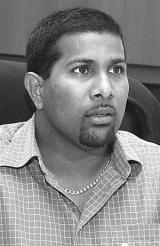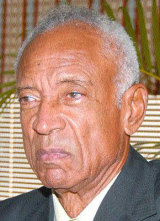
|

Ramnarine finds himself without the necessary resources or history to help him
© Trinidad & Tobago Express
|
|
A couple of decades ago, the West Indies Players' Association (WIPA) was formed, but it was so demure that it was rarely heard in public.
As the cricket industry developed worldwide, players' associations became more assertive and involved, restructuring relationships between players and their paymasters - be they cricket boards, sponsors, or endorsement seekers. This introduced a new role: that of a quasi-trade unionist with some cricket pedigree, and often an additional business-related skill. These board-busters have been shaking up the establishment for a decade, steadily improving contract terms and payments for cricketers.
For the past ten years Australian cricketers have been enjoying the best of everything, and it is no coincidence that it followed heavy investment in development programmes, or that the Australian players' association is powerful and respected.
Over that same period West Indies cricket has been at its lowest; and although WIPA has expanded its activities and interests, and grown more vociferous and assertive, respect and power for the organisation seem elusive.
It is tempting to conclude that the missing element here is development, but if you study the nature of the repeated contretemps between the West Indies Cricket Board (WICB) and WIPA, you will find at alpha points that there is a general misunderstanding of roles and responsibilities. As their worlds evolve, neither side really knows what the other is supposed to do. Hunker this down with the traditional relationship - where boards call the shots and players are mere minions, where there is no culture of discussion, and where social and political networks draw the lots for positions of power - and it becomes easier to understand the inevitability of clashes.
There is no history of partnerships to guide negotiations between the two, and as they encounter new dimensions to managing cricket, the complexity of the tasks confuse them. And because they do not trust each other, their instincts are to indulge in sophistry and cunning to score public points as they gamble on the chance that the other might be wrong.
The behaviour defining the relationship between the WICB and WIPA is precisely of the sort that one should expect of parties who lack confidence in their own competence. Because they are unable to let go of the old ways and hold hands to better navigate the new, they cannot accept that neither entity on its own can rise to the challenges of our times.
This is the heart of the problem that has emerged like a Medusa gone wild between the WICB and WIPA.
It is easy to just scrape at the first layer of muck and ascribe blame to the manner of the people at the forefront. Given their deportment, one is scarcely challenged to search beyond. On the one hand there is the WIPA President, Dinanath Ramnarine, a former Test player, who rubs many people the wrong way by the belligerence that lies just beneath his skin.
Ramnarine has many ideas about broadening the ambit of WIPA to include several educational and development programmes for players. He genuinely wants to see the lot of the cricketer improved - perhaps this might be connected to his own feeling that he was unfairly forced out of West Indies cricket - and he works hard in pursuit of this. But Ramnarine has found himself in waters without boundaries or buoys and his organisation has not had the necessary resources or history to help him. He has been doing much of the work on his own, and although he has found help, he is still stretched thin.
He has brought a tremendous amount of energy to the role, and while that is vital, his frenetic aura can be disconcerting. Conversations with him can leave one dazed as he streams from one topic to the other, and one cannot imagine him pausing ever, so torrential are his outbursts.
 Ramnarine has many ideas about broadening the ambit of WIPA to include several educational and development programmes for players. He genuinely wants to see the lot of the cricketer improved - perhaps this might be connected to his own feeling that he was unfairly forced out of West Indies cricket - and he works hard in pursuit of this
Ramnarine has many ideas about broadening the ambit of WIPA to include several educational and development programmes for players. He genuinely wants to see the lot of the cricketer improved - perhaps this might be connected to his own feeling that he was unfairly forced out of West Indies cricket - and he works hard in pursuit of this

|
Ramnarine does not trust the WICB, and if one were to check the record of their dealings for the past five years or so of his tenure, it is clear why. He has had little reason to, and given his prior relationship with the board and its functionaries (remember, he retired at 28, having played in 12 Tests and taken 45 wickets with some pretty good legspin) there is nothing really to suggest there will be any improvement without fundamental changes.
But despite talk by the WICB's outgoing president, Ken Gordon, that the recently appointed Governance Committee was the most important ever established, the board is not in a hurry to institute the changes the committee has recommended - not when one of those was that the board should give way to a more representative body.
The latest slew of exchanges between the board and WIPA revealed the nature of the tension between them. Ramnarine has charged the board with reneging on terms of their MOU, particularly with regard to including WIPA in negotiations affecting players. Gordon has accused Ramnarine of basically cussing off everyone and calling them liars.
In print Ramnarine has been careful to stick to issues, though it is quite easy to imagine him throwing some bad words the board's way. This is what ticks them off mostly, it seems, since when it comes down to the issues at hand, the WICB really does not counter his charges with substance.
At this juncture, there is something to be gleaned from an interview on CaribbeanCricket.com with the former WICB Chief Cricket Operations Officer, Zorol Barthley. Barthley has accused the board of trying to save face in the dispute over interpreting what was included in the Future Tours Programme (FTP) by seeking to discredit him and tarnishing his reputation in the process. Barthley spoke of his good relations with Ramnarine, and of others who found him willing to argue a point amicably over a meal. Others have said the same of their dealings with Ramnarine.
Those who have found him obnoxious are those who have dealt with him in less than good faith. There are those, too, whose notions of social hierarchies are affronted by the idea of this little loudmouth daring to challenge the high and mighty. The Jamaica Gleaner, for example, recently posted two editorials writing off Ramnarine and WIPA. The first, in May, was over the issue of the FTP, and the Gleaner was clear: "Our position is that the WICB should pay the West Indies players not one red cent more. Nor should the board negotiate with WIPA. Mr Ramnarine, and whoever else, should be sent packing forthwith."

|

Ken Gordon has accused Ramnarine of basically cussing off everyone and calling them liars
© Getty Images
|
|
Fuming at what it considered to be underperforming players seeking more money, it concluded that, "In the past, tough action by the WICB has not easily found favour with the Caribbean public. The board's own mismanagement robbed it of moral authority. This time, however, things are rather different. The West Indian public, we believe, would back the WICB and rebuff the arrogant posturing of WIPA and the players."
Recommendations that players should have performance-based packages are valuable, but are not linked to the issue of what constitutes tours or matches inside or outside the purview of the FTP. What comes across here is the general disgust over performance, and an attempt to blame WIPA for it. On July 18 the Gleaner got more personal after the Gordon/Ramnarine exchange.
"Whatever the reasons why he never quite made the grade as a Test player, Mr Ramnarine has transformed himself into a trade union leader, as the CEO of WIPA, negotiating on behalf of the players. His is a trade unionism of the old order; one encrusted, in our view, in an archaic confrontationalism rather than an attempt to build partnership and trust. Which is largely the point that has been made by Ken Gordon, the WICB president, in relation to Mr Ramnarine's latest salvo."
The next day, the Trinidad Express, a paper once headed by Gordon, echoed the Gleaner: "Mr Gordon has suggested to the WIPA president that the latter should engage in some honest self-analysis of his own style rather than seek comfort in the view that it is the style of everybody else which is wrong. The least Mr Ramnarine could now do is to consider, in a spirit of humility, whether Mr Gordon's assessment has any merit or whether he just happens to be always right."
Ramnarine's manner, said Gordon, "stymied" attempts to work together, and this is what exasperated leader writers have latched onto. But the root of it is more accurately traced to repeated breaches of trust in the course of the board's negotiations with WIPA.
Gordon's response has essentially been a reprimand to Ramnarine for speaking without finesse to his superiors, for not showing respect to authority. But the WICB does not show respect for WIPA either. Its brand new website carries the list of WIPA's executive from January 2001, listing Courtney Walsh as its president.
There is a culture that gives a ready ear to voices coming from the upper echelons, and were Ramnarine to speak from that position, I bet the response would have been different.
Do you believe the West Indies Cricket Board reacted appropriately to the West Indies Players' Association's accusattions? Tell us here Vaneisa Baksh is a freelance journalist based in Trinidad

